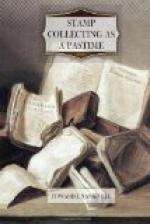Old postage stamps—bits of paper, as they are contemptuously called by some people—may have no intrinsic value, but they are, nevertheless, rich in memories of history and of art; they link the past with the present; they mark the march of empires and the federation of states, the rise and fall of dynasties, and the peaceful extension of postal communication between the peoples of the world; and, some day in the distant future, they may celebrate even yet more important victories of peace.
[Illustration:]
[Illustration:]
II.
The Charm of Stamp Collecting.
His Royal Highness the Prince of Wales, in a letter to a correspondent, referring to stamp collecting, wrote: “It is one of the greatest pleasures of my life”; and the testimony of the Prince of Wales is the testimony of thousands who have taken up this engrossing hobby.
The pursuit of a hobby is very often a question of expense. Many interesting lines of collecting are practically closed to all but the wealthy. But stamp collecting is open to all, for the expenditure may in its case be limited at the will of the collector to shillings or pounds. Indeed, the adaptability of this hobby is one of its chiefest charms. The rich collector may make his choice amongst the most expensive countries, whilst the man of moderate means will wisely confine himself to equally interesting countries whose stamps have not gone beyond the reach of the man who does not wish to make his hobby an expensive one. The schoolboy may get together a very respectable little collection by the judicious expenditure of small savings from his pocket money, and the millionaire will find ample scope for his surplus wealth in the fine range of varieties that gem the issues of many of the oldest stamp-issuing countries, and which only the fortunate few can hope to possess.
In all there are over three hundred countries from which to make a selection. In the early days collectors took all countries, but as country after country followed the lead of England in issuing adhesive stamps for the prepayment of postage, and as series followed series of new designs in each country, the task of covering the whole ground became more and more hopeless, and collector after collector began first to restrict his lines to continents, and then to groups or countries, till now only the wealthy and leisured few attempt to make a collection of the world’s postal issues.
This necessary restriction of collecting to groups and individual countries has led to specialism. The specialist concentrates his attention upon the issues of a group or country, and he prosecutes the study of the stamps of his chosen country with all the thoroughness of the modern specialist. He unearths from forgotten State documents and dusty files of official gazettes the official announcements authorising each issue. He inquires into questions




